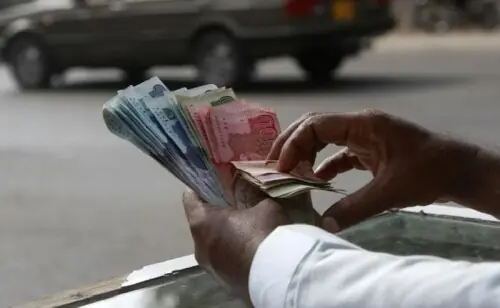The Porali river is situated in Bela town, the most populated town in Lasbela, on the Regional Corporation for Development (RCD) highway that connects Quetta and Karachi at a distance of over 700km. Officials and locals who spoke to Dawn in Bela and elsewhere in the district believe that flood waters spilled over Porali’s banks, inundating the town of Bela.
In Uthal, the headquarters of district Lasbela, a senior officer from the deputy commissioner’s office drew a map of the floods that inundated the Lasbela district. The Porali river, he said, caused most of the damage in Lasbela.
Under the World Bank-financed Balochistan Integrated Water Resource Management and Development Project (BIWRMDP), the total cost of Porali (Bela) and Nari river (Sibi) basins was $110 million. Documents available with Dawn suggest that during the monsoon season, the Porali River received very high-intensity floods of about 218,600 cusecs on the midnight of 24th-25th July 2022, with another high-intensity flood on 19th-20th August 2022.
The document further states that the Tharra Bund constructed in the past that was meant to protect the Bela town was also damaged and washed away by the flood.
It is not only climate change that is causing devastation — it is also the mismanagement and negligence of the authorities in executing developments
In 2016, Sikander Brohi, a researcher and civil society professional, discussed the Porali River in his article “Balochistan’s irrigation dilemma”. According to him, the project seems to be a case of misplaced priorities, developed without proper participation from relevant local communities. Like others who have said the same, no one paid any heed to them. Thus, those who were aware knew Porali would cause destruction during torrential rains and floods — but who was there to listen?
When this scribe reached Bela in August, most of its urban centres were still submerged under water. One such place in the heart of Bela is Sheikh Goth, Sandeman Park Bela, where I met Zubair Baloch, a driver’s son, playing around Sandeman park.
Like Sandeman park today, Zubair’s place is also submerged along with other houses and schools in their Goth. As most of the homes in Sheikh Goth are pakka (concrete), they were cracked or still stood among the flood waters pouring out of the Porali river. Zubair and others had shifted to a safer embankment in the vicinity.
“Our house is partially damaged,” says Tanver Lasi, a student of BS English at a university in Lasbela, standing in front of his house in sports clothes. “Our family moved to this place for better education from rural Lasbela.”
Similar to Mr Lasi’s family, most of the over 100 families had moved to the heart of Bela, in Sheik Goth, for the same purpose. But unfortunately, they are at the mouth of floods, pouring out of the Porali river at any time. “We have to pay the price due to the mismanagement of the river,” they complain.
In Lasbela, other than Porali, rivers have broken the road between the towns of Bela and Utha at four points. Big and small trucks were parked on the road, causing traffic jams. Only small vehicles were allowed to pass between the said towns, when this scribe visited.
Similarly, the torrential rains and floods in other parts of Balochistan have blocked the highways, railway tracks and other communications services with the rest of the country.
In Uthal, the deputy commissioner’s office bearers say they are trying to reach out to flood-hit people to provide rations and tents, particularly in Lakra, a town where most people are stuck and inundated. “We also moved equipment to the Pirali river basin to stop further damage,” says an officer. Due to torrential rains and floods, it is one of the most flood-affected districts in Balochistan.
In many places, floods have been caused by rivers overflowing.
Like the Porali river, Sibi, situated southeast of Quetta at a distance of 110km, also has a story of river destruction: the Nari river. Nari river was also financed along with the Porali river by the World Bank. The residents of Sibi live in constant fear of the Nari river’s rising waters.
“The situation was quite bad,” says Mansoor Qazi, the young and bespectacled Deputy Commissioner of Sibi, adding that the discharge capacity of Nari Gaj is 150,000 cusecs water while the water had come around 230,000 cusecs. “It has overflown in many places, submerging villages in Sibi, including the city. So, we have used breaches in some places to save the populated areas.”
Evidently, it is not only climate change that is causing destruction, it is also the mismanagement and negligence of the authorities in executing developments in Balochistan.
Published in Dawn, The Business and Finance Weekly, September 12th, 2022



































